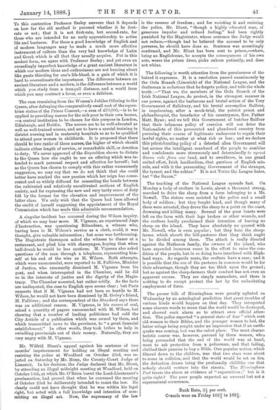A singular incident has occurred daring the Wilson inquiry, of
which we may hear more. M. Vigneau, an experienced Jnge -d'Instruction, was questioning Ribaudeau, a witness who, having been in M. Wilson's service as a clerk, could, it was thought, give valuable information ; but none was forthcoming. The Magistrate thereupon asked the witness to dinner at a restaurant, and plied him with champagne, hoping that when half-drunk he would be less cautious. M. Vigneau also asked questions of the man through a telephone, representing him- self at his end of the wire as M. Wilson. Both attempts, which were unsuccessful, were reported to M. Fallieres, Minister of Justice, who summarily dismissed M. Vigneau from his post, and when interrogated in the Chamber, said he did so in the interests of justice and the dignity of the Magis- tracy. The Chamber assented, but rather coldly. As the facts are undisputed, the case to English eyes seems clear ; but Paris suspects that if M. Vignean had not been so hostile to M. Wilson, he would not have been dismissed by M. Grevy's friend, M. Fallieres ; and the correspondent of the Standard says there was an additional reason. M. Vigneau, in his excess of zeal, seized a quantity of papers unconnected with M. Wilson, but showing that a number of leading politicians had sold the City Article of a publication which was owned by them, and which transmitted news to the provinces, to "a great financial establishment." In other words, they took bribes to help in swindling provincials out of their money. Naturally, they are very angry with M. Vigneau.






































 Previous page
Previous page